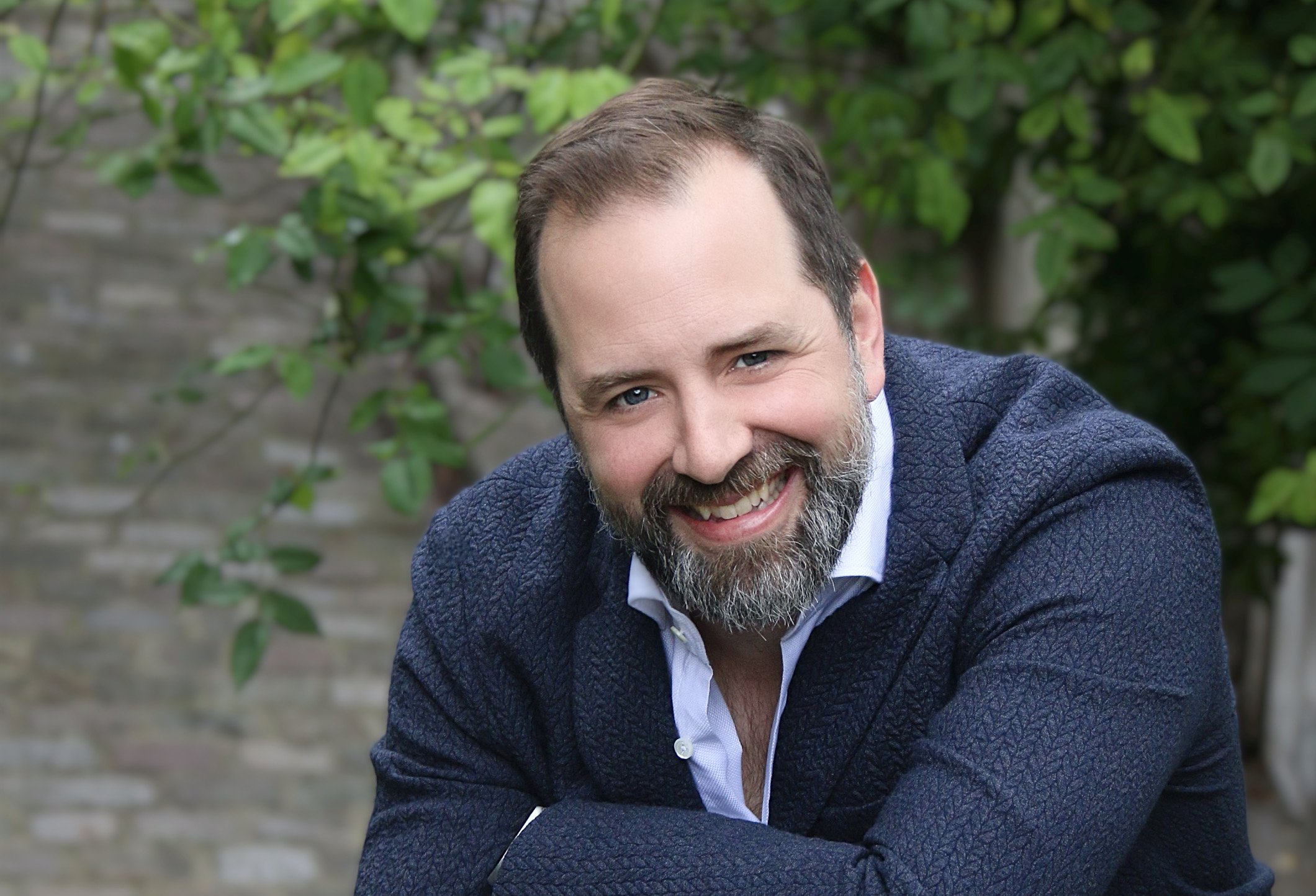Canadian baritone Etienne Dupuis takes us to Berlin, where he is singing the title role in Verdi‘s Rigoletto at Deutsche Oper Berlin on January 10th, 17th & 27th (info and tickets here).
Etienne appears regularly on the world’s top opera and concert stages. In the latter half of the 2024/25 season, he can be seen at Deutsche Oper Berlin, Wiener Staatsoper, Opera Australia and the Royal Opera House. He is also an ambassador of Opera for Peace and is the co-artistic director of The Canadian Institute of Vocal Arts along with his wife, soprano Nicole Car.
While in Berlin, Etienne shares his love for the city, what he gets up to in-between rehearsals and a possible real estate opportunity (if you happen to be looking)… Read on to find out more.
City where you’re working?
Very obviously, Berlin.
How long are you working on contract?
The contract is from January 2nd to January 27th, which is the last performance. We have a performance on the 10th, one on the 17th, and one on the 27th, which means that in between shows, I will be traveling back and forth to Paris, where home is.
What’s the opera house like?
The Deutsche Oper Berlin is a fantastic place to be, mostly because for the years that I was there – and I’ve been there for 15 years now – it’s always been extremely family-friendly, with familiar faces, smiles and people just happy to see you. It didn’t matter if it was people from the orchestra, the chorus, or the whole staff, the KBB. I’ve seen the familiar faces for years and years and years. And today, for the first time in January 2025, I’m seeing new faces. The KBB has a new employee. Of course, I’ve seen some of the same faces in the chorus, but also many new ones. Same in the orchestra, same in the staff, and all the ensemble singers; I used to know them pretty well, and the ensemble has renewed greatly. With a lot of new young faces, new young voices, which is wonderful to see, obviously, but for the very, very first time at the DOB, I am feeling old.
Where is the most peaceful place in the city?
There are tons of peaceful places in Berlin. Berlin is a peaceful city. There are two of them, and they are very close to each other. I love the zoo: it is nice and peaceful, especially when you can go in the middle of the week. It’s quiet, the animals are nice. I particularly like the big cats and even more so the chimpanzees and gorillas. They are among my favorites. But I’ve always thought walking the streets of the zoo in Berlin in the Zoologischer Garten was really lovely. It just calms me down.
My second favorite is peaceful for the mind, not necessarily for the ears, and it’s the Tiergarten: there’s an exquisite beer garden there, just by the water. Well, it depends on when you go, but if you go with a few friends when it’s not jam-packed, it’s actually a really restful place. Just trees all around, the beautiful water, some people rowboating, you have a nice drink and delicious food, and you can have a quiet chat. It’s always been one of my favorite places in the city.
Coolest bar or restaurant you’ve been to?
I haven’t been to any cool bars or restaurants in the, let’s say, the upper-class meaning of the term. But as I said in a previous answer, I really like beer gardens; I’ve been to beer gardens all around Germany, and in most of them, especially when trees and water surround them, it’s like you’re in the middle of nature. I just find them so peaceful and relaxing and cool.
An activity you have done that is unique to the area?
Yes, there is an activity that I’ve done that is unique to the area. It happened quite a few years ago, but is still engraved in my brain for the rest of my life. Our very own Brian Dietrich is one of the most creative, nicest people I’ve ever met. In the summer, he is a tourist guide here in Berlin, and he has a take on the city, which is a storytelling take. It’s a play. It’s a six- to eight-hour immersive play. I took my wife Nicole, and we went on a tour with Brian a few years back. And it’s, to this day, one of the most insightful, wonderful, emotional and beautiful experiences I’ve had the pleasure to do. I highly recommend it to anyone who happens to be here between June and September or maybe July and August. He’s got a gorgeous, wonderful universe inside of him. He’s passionate about the city of Berlin and its history. You can witness that: it transports you somewhere else. It’s unbelievable.
Is there something unexpected that happens locally that you discovered?
Something unexpected, especially for Canadians – I’m sure everyone in Germany knows about it. I’ve been here several times in Berlin on New Year’s. And New Year’s Eve for Germans, for Berliners, is the occasion for them to celebrate with fireworks a lot. And by a lot, I mean a ginormous amount of fireworks. They start when the sun comes down; everybody buys fireworks, uses them, and goes through the whole night. People shoot them on the street, and they shoot them out of their windows. I remember walking on the 31st of December, going to a party, almost being hit in the head by fireworks, being thrown out of windows. It is a fascinating thing to see. And if you, like me, are a bit triggered by violent explosions, it may not be something you will enjoy. But it is definitely unique to Germany. I’ve never seen it anywhere else, anyway.
How did you find accommodation?
Finding accommodations: this is an answer that applies to every city I work in. It’s usually just a matter of Googling. There’s always Airbnb. There are always websites. It depends on how short or long your stay is. For a more extended stay, I usually look for an apartment, while for shorter stays, it can be in a hotel. The key is that I really need, ideally, a kitchen, which could be in a case of emergency just a fridge and a microwave. In this particular case, it is the friend of a friend who has a lovely, very beautiful apartment in Charlottenburg, which was available when I was here, so we rented it.
What’s the most important thing you think of when it comes to finding accommodation as a singer?
The most important thing when I look for accommodation is quiet and rest. I know that many singers prefer places where they can sing, but the truth is you can always sing most of the time; you can sing at the theaters or the venues where you work. I look for something different. You need a quiet place and a place where you will be quiet as well. Yes, maybe warm up before rehearsing, a maximum of 20 or 30 minutes. But the rest of the day, once the rehearsal is over, especially if you’re singing a big title role, it’s nice to come home and not talk. Shut up. Rest your instrument. Athletes don’t spend all day long doing the sports they’re paid for. The downtime is essential. And then perhaps a close second would be internet connections, because when you’re awake, you need to keep in contact with your family and loved ones. And as I mentioned previously, thirdly, you need to have some form of comfort, which includes a kitchen, a nice shower, a nice bed, and a lot of rest.
I mentioned Brian Dietrich’s tour before, but I’ve seen a few back in the day regarding galleries and museums. The thing is, I’ve been coming to Berlin for the last 15 years, but I haven’t done so much here since the pandemic, because traveling was an issue, and a few of my contracts were canceled due to the pandemic. So I replaced them with other contracts in other cities. We didn’t have the chance to return to Berlin often in the last five years, which is sad because I miss it, it’s a city I love. As I said before, I find it peaceful. It’s got a lot of movement, a lot of people, a lot of amazing things to see, and a lot of culture, but it also has space and a sense of quiet. I don’t find people to be rushed to go anywhere.
The bus, metro, and bike systems are so well developed that traveling through the city is not hard and is usually relaxed. Its only flaw for me is that they had to shut down the Tegel Airport, which was phenomenal, especially when working at the Deutsche Oper. You landed almost in the city, 15-minute cab ride, and you were at the theater. But the airport that is open now is much further out and not easy to reach, even with the train system. This has actually lowered the efficiency of going in and out of the city, but once you’re in, Berlin is a treat. It’s always a haven of peace for me. I love being here. I’m sad I don’t get to come more often, and I’m sad that I even have to sell the apartment I bought over a decade ago because we don’t come back enough. But that’s the reality of life. We can’t just always be in the same place. I have two more contracts in Berlin. I have another contract next year. And then I don’t know when I will return to this wonderful city. But it will always have this humongous place in my heart. And in my career development, obviously.
I think anytime anyone reads about any place in the world, if they’re even in the slightest interest in discovering it, then they have to. I think you have to. You owe it to yourself. You owe it to yourself to try to engage in conversation with someone from that place. Culturally speaking, we are different, but humanly speaking, we’re the same. And so it’s about finding those things that are the same and those that aren’t. And to me, that’s the most fascinating thing about travel, about living in different places worldwide. So I’d recommend just taking the plane, the train, the car, whatever, and getting your mind, heart, and soul in a different city. Berlin is definitely one that has plenty to offer for anyone with an open mind and an open heart. And if you’re looking to buy a place, I know someone.
LEARN MORE ABOUT ETIENNE DUPUIS
VISIT HIS WEBSITE
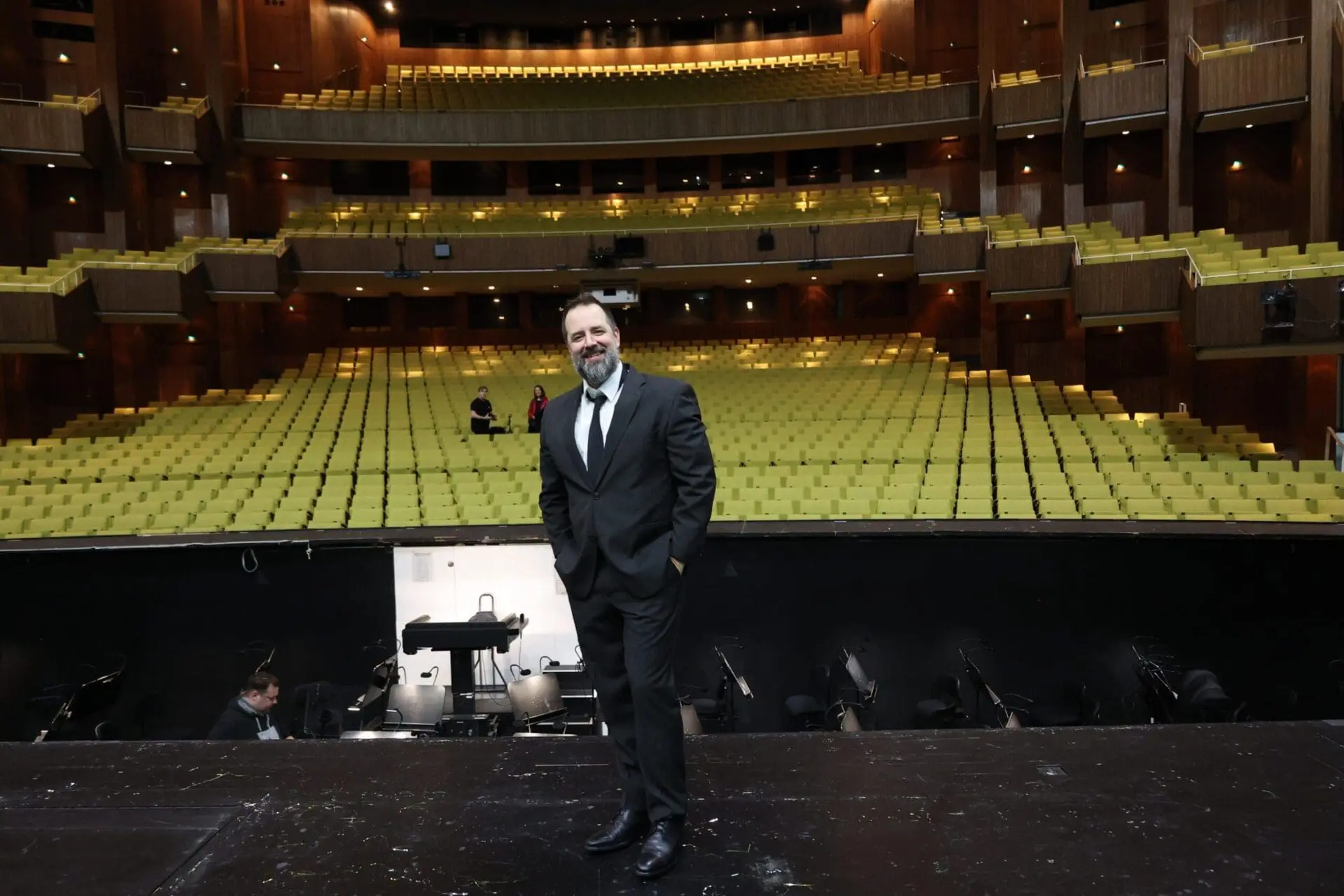
© Tim Weiler
On stage at Deutsche Oper Berlin
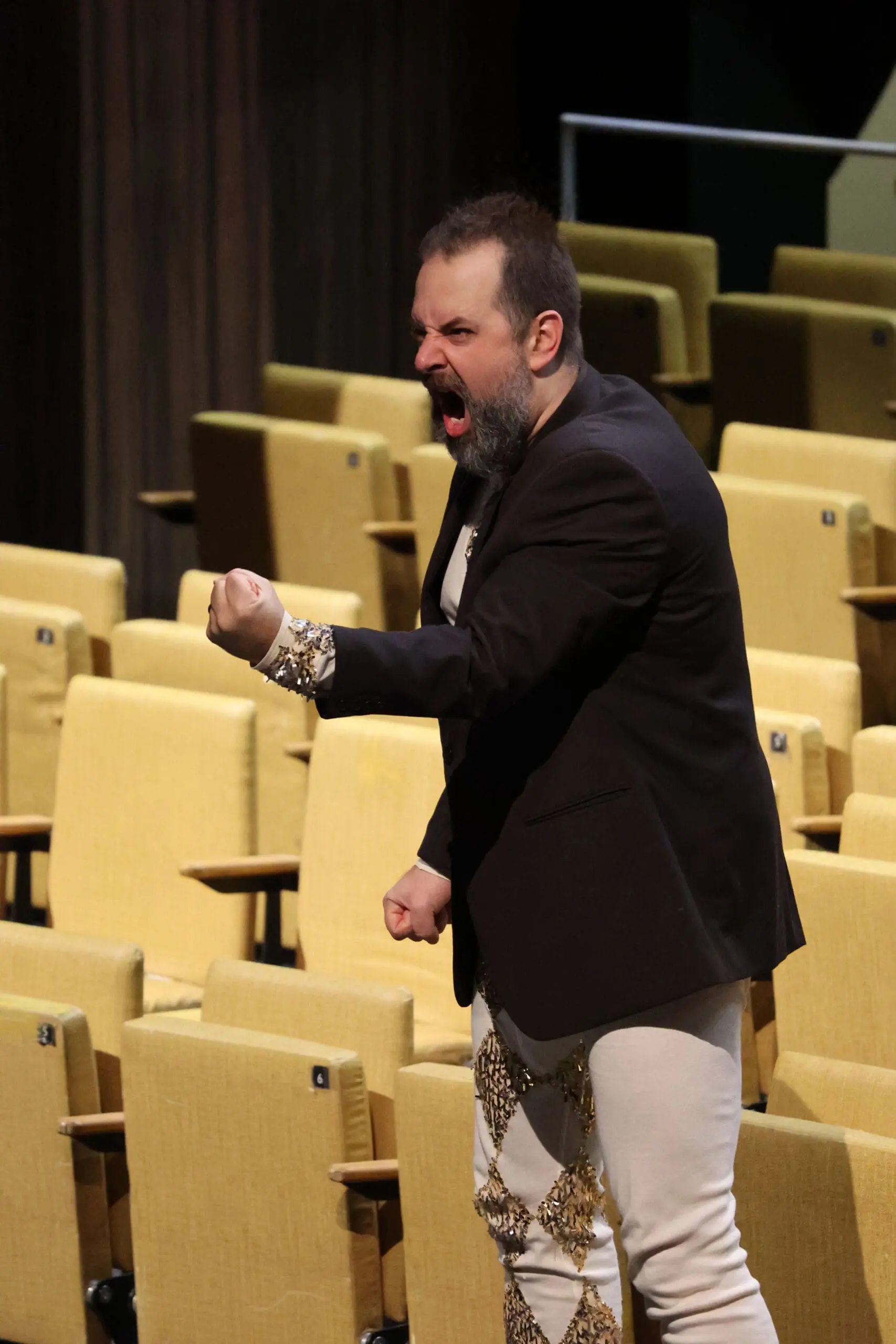
© Tim Weiler
Dress rehearsal for Rigoletto
(rehearsal was without lighting and makeup)
Outside of the opera house
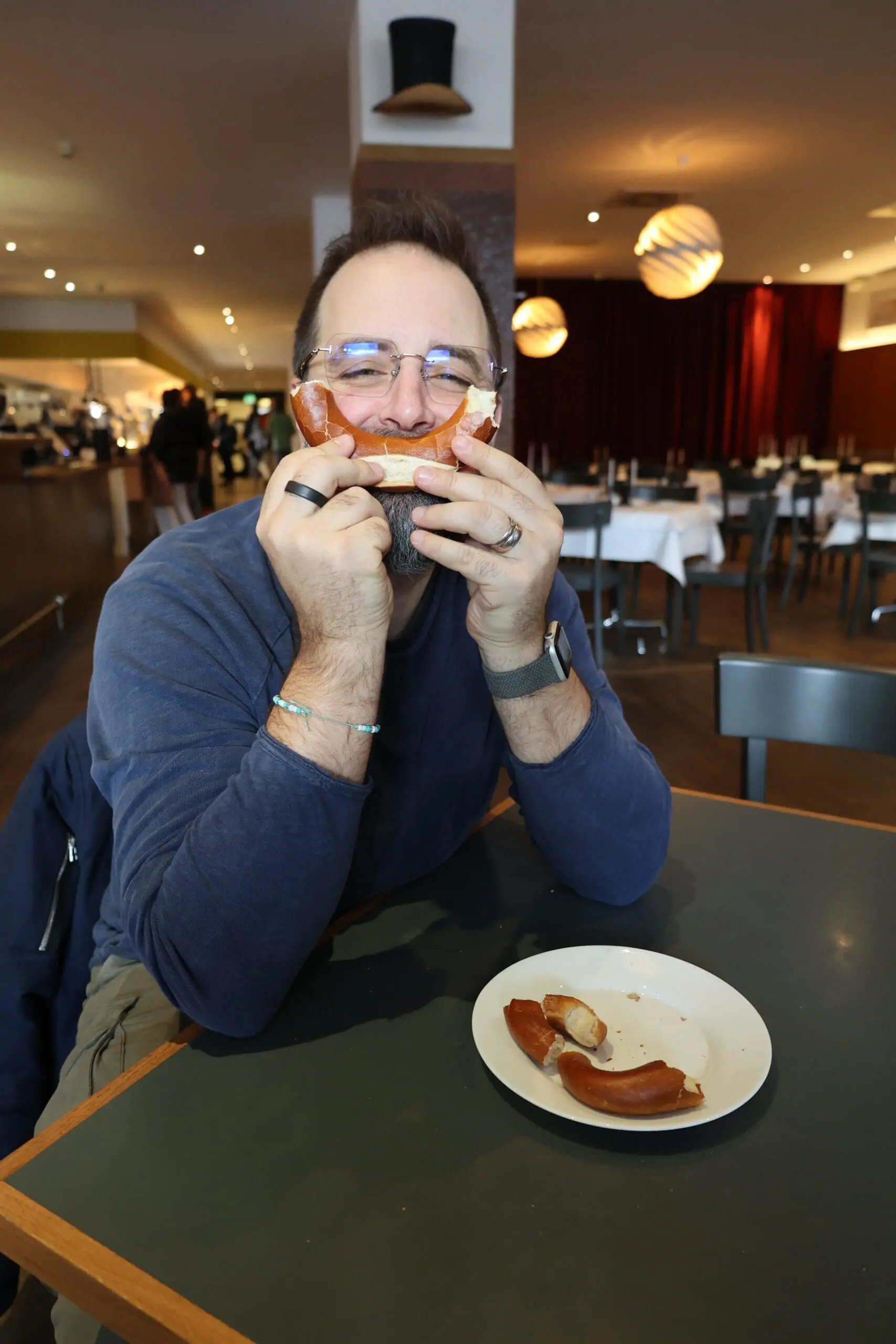
© Tim Weiler
Enjoying a brezel in the restaurant of the Deutsche Oper Berlin
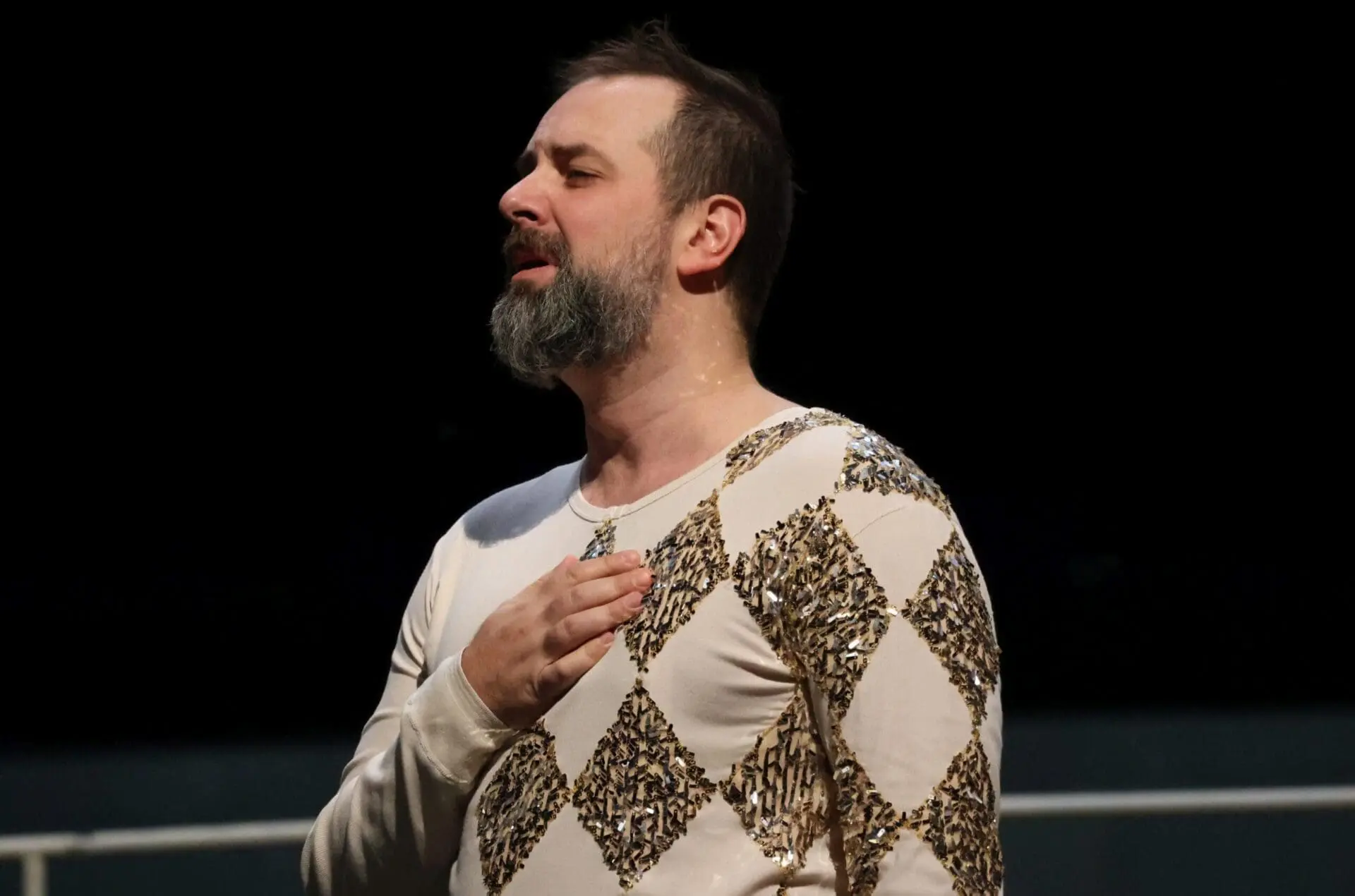
© Tim Weiler
Dress rehearsal for Rigoletto
(rehearsal was without lighting and makeup)
Rigoletto
Deutsche Oper Berlin
January 10, 17 & 27
CONDUCTOR: Michele Spotti
DIRECTOR: Jan Bosse
STAGE-DESIGN: Stéphane Laimé
COSTUME-DESIGN: Kathrin Plath
CHORUS MASTER: Jeremy Bines
THE DUKE OF MANTUA: Andrei Danilov
RIGOLETTO: Etienne Dupuis
GILDA: Brenda Rae
THE COUNT OF MONTERONE: Geon Kim
THE COUNT OF CEPRANO: Jared Werlein
THE COUNTESS OF CEPRANO:
Alexandra Oomens
MARULLO: Kyle Miller
MATTEO BORSA: Kieran Carrel
SPARAFUCILE: Tobias Kehrer
MADDALENA/GIOVANNA:
Stephanie Wake-Edwards
A BAILIFF: Stephen Marsh
A COURT LADY: Maria Vasilevskaya
CHORUS:
Chor der Deutschen Oper Berlin
ORCHESTRA:
Orchester der Deutschen Oper Berlin
About the work
“As for the effect that a work has as a piece of theatre, I’d say that RIGOLETTO is the best material that I’ve ever set to music […]. It has very powerful scenes, there’s temperament, pathos, a lot of variety.” [Verdi to Antonio Somma, 22nd April 1853]
In describing the attributes of his 1851 melodrama based on Victor Hugo’s acclaimed play “Le roi s’amuse” Verdi also puts his finger on the challenges that any director has to address: RIGOLETTO is namely a masterpiece whose particularity lies in the clash between the characters’ psychology and the improbable action of a fantasy storyline.
It’s a tale that smacks of gothic horror. In his role as court jester to the Duke of Mantua, the hunchbacked Rigoletto is despised by the collected courtiers and in return makes fun of all the men whose wives have been ravished by his boss, a notorious womaniser. So nervous is he that his own daughter, Gilda, might fall victim to the Duke that he conceals her very existence. Finally Rigoletto realises that his attempt to preserve the cocoon of his family life is doomed to fail in this environment of wanton violence. Gilda is seduced too by the Duke, even laying down her life for him.
It is Verdi’s music that gives the story its emotional credibility and makes RIGOLETTO a tragedy that unfurls as a result of the interaction of three very different people – the Duke, a rake for whom Verdi wrote such seductive music that Gilda and the audience alike are swept up in his aura; Rigoletto, one of those typical Verdi creations who have good and bad sides to them; and finally Gilda, a pristine personification of innocence and sympathy. In RIGOLETTO we identify especially with these three people and come to view even the craziest chance incidents as the characters’ inescapable destiny.
About the production
In his first opera production in Berlin, Jan Bosse too was attracted by this exploitation of musical theatre to maximum effect. In his production Bosse transforms the auditorium of the Deutsche Oper into the Court of Mantua and the under-stage trap room into the hiding place used by Gilda, the daughter of Rigoletto the jester. Rigoletto’s efforts to keep his private life separate from his job in the service of a corrupt regime are futile, however, and his world gradually collapses into its component parts. In the end, with his daughter dead and all his plans dashed, Rigoletto is left, literally, with nothing.
Opera Canada depends on the generous contributions of its supporters to bring readers outstanding, in-depth coverage of opera in Canada and beyond.
Please consider subscribing or donating today.

